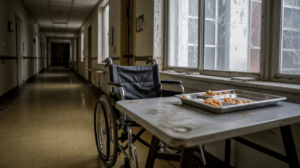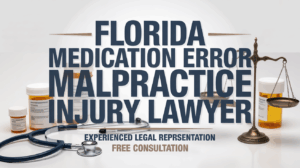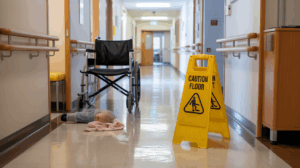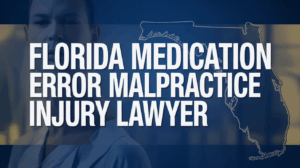
Yes, nursing homes are covered by medical malpractice law. When nursing home staff or healthcare providers fail to meet the accepted standard of care and cause harm to residents, they can be held legally accountable.
If you believe a loved one has suffered due to negligent care in a nursing home, consulting with a Florida medical malpractice lawyer can help you understand your legal options and pursue appropriate compensation.
Understanding Medical Malpractice In Nursing Home Settings
Medical malpractice in nursing homes occurs when healthcare professionals or facilities fail to provide care that meets the accepted standard in the medical community, resulting in harm to residents. While not all adverse outcomes constitute malpractice, certain patterns of negligence or substandard care may form the basis for legal claims.
Nursing homes have a legal duty to provide appropriate care to their residents. This includes:
- Proper administration of medications
- Timely response to medical emergencies
- Appropriate treatment of health conditions
- Prevention of infections and pressure sores
- Adequate hydration and nutrition
- Proper monitoring of residents’ conditions
When nursing homes employ medical professionals like doctors, nurses, or therapists, these individuals must adhere to the same standards of care that apply in other healthcare settings. Their actions or omissions can lead to medical malpractice claims if they fall below these standards and cause harm.
However, nursing home cases often involve a mix of medical and non-medical care. Some claims may fall under medical malpractice law, while others might be categorized as general negligence or violations of nursing home regulations. Understanding the distinction is important, as different legal standards and procedures may apply.
Common Types Of Medical Negligence In Nursing Homes
Nursing homes provide both medical and custodial care, creating multiple opportunities for negligence that can harm vulnerable residents. Here are some of the types that are covered by medical malpractice law for nursing homes.
Medication Errors
Medication errors are among the most common and potentially dangerous forms of negligence in nursing homes. These errors include:
- Administering the wrong medication to a resident
- Giving incorrect dosages (too much or too little)
- Missing scheduled doses or administering medications at the wrong times
- Failing to monitor for adverse drug reactions or interactions
- Not considering a resident’s medical history or allergies
- Improper documentation of medication administration
The consequences of medication errors can be severe, particularly for elderly residents who may take multiple medications and have compromised health. These errors can lead to adverse drug reactions, worsening of medical conditions, or even death.
Failure to Manage
Another serious form of medical negligence in nursing homes involves failures in managing resident health conditions. This includes:
- Delayed recognition of significant changes in a resident’s condition
- Failure to notify physicians when problems arise
- Inadequate monitoring of chronic conditions like diabetes or heart disease
- Improper wound care leading to infections
- Lack of appropriate fall prevention measures
- Failure to prevent or properly treat pressure ulcers (bedsores)
Understaffing often contributes to these problems, as overworked nurses and aides may not have sufficient time to properly assess and care for each resident. However, staffing shortages do not excuse facilities from their legal obligation to provide appropriate care.
Inadequate training of staff can also lead to medical negligence. Nursing home employees must know how to properly care for residents with complex medical needs, recognize warning signs of deteriorating health, and respond appropriately to emergencies. When facilities fail to ensure their staff are properly trained, residents suffer the consequences.
Legal Rights Of Nursing Home Residents
The federal Nursing Home Reform Act establishes a baseline of rights for all residents in Medicare and Medicaid-certified facilities. These rights include:
- The right to freedom from abuse, mistreatment, and neglect
- The right to freedom from physical restraints
- The right to privacy and confidentiality in medical treatment
- The right to accommodate physical, psychological, and social needs
- The right to voice grievances without discrimination or reprisal
- The right to participate in the review of one’s care plan
- The right to be fully informed about medical conditions and treatments
Florida law provides additional protections for nursing home residents through the Florida Nursing Home Residents’ Rights Act. This legislation strengthens residents’ rights and establishes clear legal remedies when these rights are violated.
When nursing homes fail to respect these rights and provide appropriate care, residents and their families have legal recourse. Depending on the circumstances, claims might be pursued as medical malpractice, general negligence, or violations of residents’ rights.
How To Recognize Signs Of Medical Malpractice
Identifying potential medical malpractice in nursing homes can be challenging, especially since residents may have difficulty communicating their experiences. Families should remain vigilant for warning signs that might indicate substandard medical care.
Physical indicators that may suggest medical negligence include:
- Unexplained injuries such as bruises, cuts, or burns
- Rapid weight loss or signs of dehydration
- Recurring infections or bedsores
- Overmedication or signs of chemical restraint (excessive drowsiness)
- Worsening of medical conditions despite treatment
- Poor personal hygiene or unclean living conditions
Behavioral changes can also signal problems with care:
- Increased anxiety, agitation, or withdrawal
- Fear around certain staff members
- Depression or sudden mood changes
- Confusion that is not associated with their medical condition
Administrative red flags that may indicate systemic problems include:
- Frequent staff turnover
- Visible understaffing during visits
- Restricted or limited visiting hours
- Reluctance to answer questions about care
- Delays in providing access to medical records
If you notice these warning signs, it’s important to document your observations, including dates, times, and names of staff involved. Ask questions and express concerns to nursing home management. If the issues persist, consider contacting your state’s long-term care ombudsman program or consulting with an attorney experienced in nursing home cases.
Filing A Medical Malpractice Claim Against A Nursing Home
If you believe a nursing home has committed medical malpractice that harmed your loved one, taking appropriate legal action can help secure compensation while holding the facility accountable. Understanding the process for filing a claim is essential for protecting your rights.
The first step is to consult with an attorney who specializes in both medical malpractice and nursing home cases. This initial consultation is typically free and allows the attorney to evaluate whether you have grounds for a legal claim.
If your attorney determines that medical malpractice likely occurred, they will:
- Request complete medical records from the nursing home and other healthcare providers
- Consult with medical experts who can review the records and identify deviations from the standard of care
- Prepare a notice of intent to sue, which is required in Florida before filing a medical malpractice lawsuit
- Conduct a pre-suit investigation as required by Florida law
- Identify all potentially liable parties, which may include the facility, individual staff members, physicians, and corporate owners
See If Medical Malpractice Law Covers Your Nursing Home Situation
Nursing homes are covered by medical malpractice law. Victims and their families can seek compensation if a nursing home breaches the standards of care. Contact us today for a free, no-obligation consultation to discuss your case and learn your legal options.
Our team will listen carefully to your story, answer your questions, and provide clear guidance about what to do next to protect your loved one.










